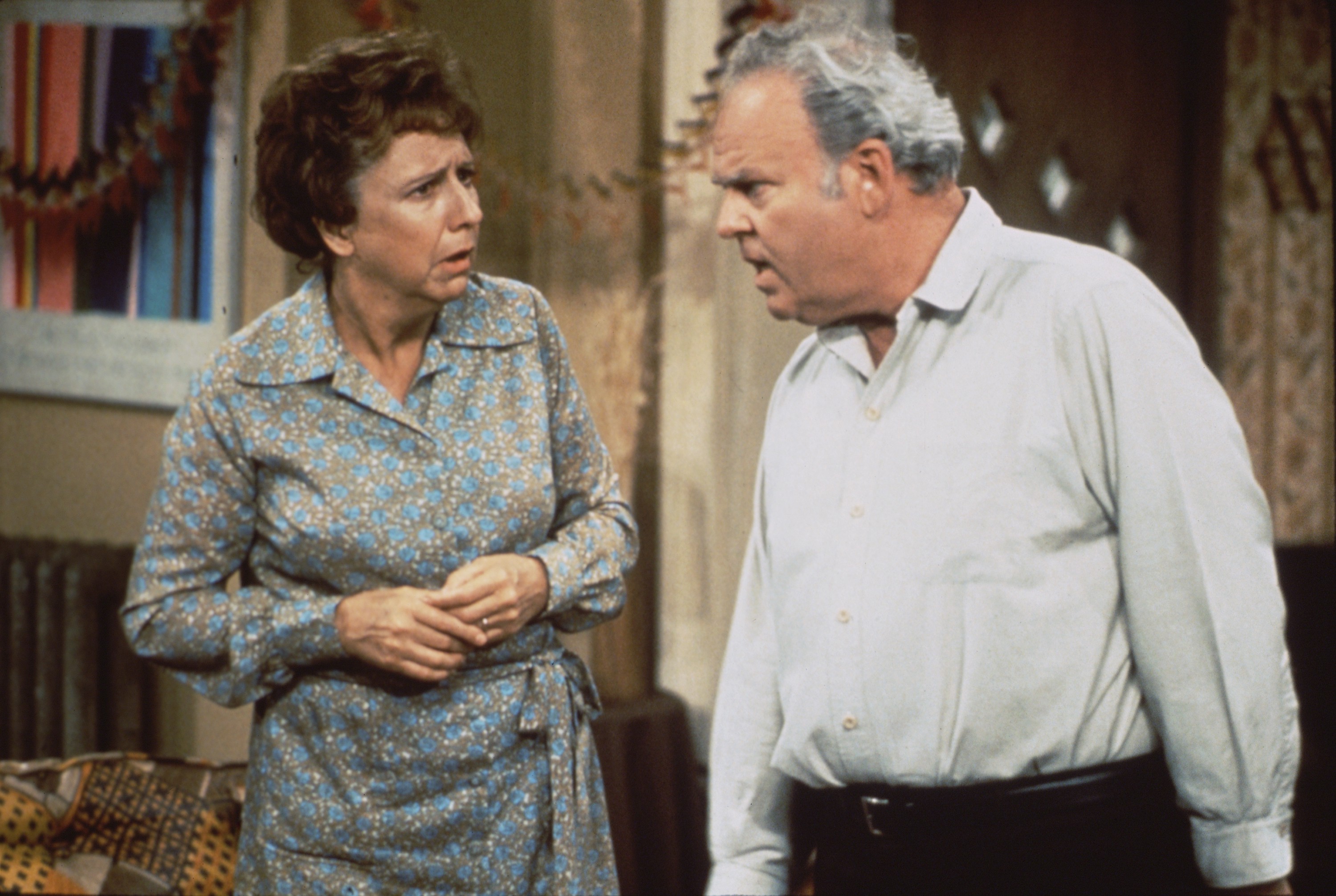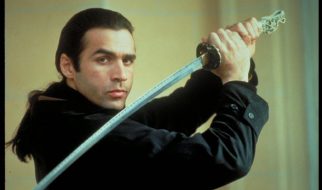How I fell in love with ?All in the Family?s? resident bigot
 Jean Stapleton and Carroll O?Connor as Edith and Archie Bunker in ?All in the Family? in 1979. Photo: CBS Photo Archive/Getty Images
Jean Stapleton and Carroll O?Connor as Edith and Archie Bunker in ?All in the Family? in 1979. Photo: CBS Photo Archive/Getty Images
Just when I thought about giving up on love, I fell. Hard. The matchmaker was YouTube. The object of my affections was the ?70s TV sitcom All in the Family, which centered on conservative middle-aged White couple Archie and Edith Bunker ? all nine seasons of which I binged greedily during quarantine.
I fell in love with Edith, played by three-time Emmy winner Jean Stapleton. Although her husband Archie dismissed her as a ?dingbat? and she often played the part, she was usually the wisest, most perceptive person onscreen.
I fell for the Bunkers? son-in-law, Michael ?Meathead? Stivic (Rob Reiner), for challenging Archie on his racism and White-supremacist ideals. I fell for their daughter, Gloria Stivic (Sally Struthers) because she called out her father, tried to encourage her mother not to be his doormat, and pointed out the hypocrisy of her husband?s brand of well-meaning but ultimately disingenuous liberalism.
I fell, too, for Lionel Jefferson (Mike Evans), the Bunkers? Black next-door neighbor. Lionel?s scenes with Archie were like nonviolent protests ? using not just words as a weapon but inflection. Lionel was far more interesting and pivotal on All in the Family than in his parents? spin-off series, The Jeffersons; he handled Archie better than Michael did, without a hint of anger in his patronizing, almost affectionate mockery. No wonder Archie was more respectful to him than any other character.
But of the five characters introduced in the show?s 1971 premiere, I fell hardest for Archie. The irony, of course, is that Archie wouldn?t have had any use for me ? a gay Black man.
And it wasn?t just me; Bunker hated everyone. He spoke disparagingly not only of Black people but also of Jewish people, Latinx people, Italians, Irish, the Polish, atheists, Catholics, women, gays, and basically anyone who wasn?t a straight, White, Protestant male. So what did I see in him?
I won?t justify my love by calling him an ?equal-opportunity bigot?; they?re just as reprehensible as those who train their hatred on just one group. I make no excuses for the guy, but I love him anyway. My appreciation has a lot to do with Carroll O?Connor, who played the role of Archie from 1971 to 1979 on All in the Family and from 1979 to 1983 on Archie Bunker?s Place ? and won a quartet of Emmys in the process. It?s a love that couldn?t have bloomed without a great actor and the maturity and perspective of my middle age.
During the initial run of All in Family, I was too young to really get the joke, which usually was on Archie. I only vaguely remember watching any of the episodes; what I do recall are the theme song and, most vividly, my fear of the cranky and irascible Archie. I can?t think of a childhood character this side of toy-hater Burgermeister Meisterburger in the animated Christmas special Santa Claus Is Coming to Town who terrified me more.
O?Connor?s portrayal was never apologetic, but if you look closely, you can almost see him winking through the bluster.
But as I grew up, I learned more about the man behind the mean. Carroll O?Connor, who died in 2001 at age 76, was a staunch liberal whose personal views were more in line with his TV son-in-law?s than the guy he played for 13 seasons. My knowledge about the actor changed how I viewed the character during my weekslong binge.
I also credit that love to O?Connor?s performance. Yes, Archie was a bigoted loudmouth, but the actor humanized him by showing glimmers of vulnerability and warmth. And his easy rapport with Lionel bordered on sweet. He was an old-fashioned guy trying to make sense of a rapidly changing world (again, an explanation, not an excuse). O?Connor?s portrayal was never apologetic, but if you look closely, you can almost see him winking through the bluster.
The writing helped, too. Series creator Norman Lear always insisted that Archie was a parody of racism, not an endorsement of it. As an adult well-versed in the ways of irony, I get it now. Archie rarely won an argument, and he was usually outnumbered as the show?s underdog. His malapropisms and inability to control the narrative (and minds) in his own castle underscored his weakness. He was set in his ways but not stuck in them. As the series progressed, he started to evolve with the times, and his grumpiness became more about his temperament than hate.
Lear initially offered Archie?s role to Mickey Rooney, who turned it down out of fear of how viewers would react to the character. Harrison Ford declined to play Mike Stivic for similar reasons. Perhaps he felt he?d be deemed guilty by association. The first episode even included a disclaimer, explaining that the show meant to poke fun at bigotry not condone it.
I can?t imagine an Archie Bunker-type character flourishing on TV today, but with the perfect writing and performer, anything is possible. Some might say (and ?some? includes me) that a Bunker-type character is flourishing on TV ? and his name is Donald Trump, the person most deserving of a derisive laugh track.
When All in the Family debuted, no one seemed to notice. The ratings were that low. It wasn?t until summer reruns started airing that viewers discovered the show. As its popularity grew, careers were made rather than ruined, and the expected controversy never really materialized. Of course, Harrison Ford was probably wise to turn down Rob Reiner?s part, as he might not have become one of the most successful movie stars of all time. With or without him, All in the Family spent the next five seasons at the top of the Nielsen ratings ? a streak only matched by The Cosby Show in the ?80s and American Idol in the ?00s.
I try not to think too hard about why Americans connected with Bunker in the ?70s. Did they understand what the show was trying to do, or did they think he was speaking for them? It was likely a lot more of the latter than many people would be willing to admit today ? but I won?t hold the cluelessness of those viewers against the show. While the bigotry of George Jefferson and Fred Sanford both played strictly for laughs, All in the Family presented the race and culture wars of the ?70s in a more complex and layered way.
Archie Bunker may not have been particularly likable, but by revealing the American lie through his misguided personal truth, he more than earned my love.


